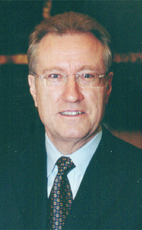Mr. Speaker, I rise on a point of order. I wish to inform the House that it is my intention to propose that this bill be referred to committee before second reading, pursuant to Standing Order 73(1).
 House of Commons photo
House of Commons photoWon his last election, in 2000, with 71% of the vote.
Regulatory Efficiency Act December 6th, 1994
Mr. Speaker, I rise on a point of order. I wish to inform the House that it is my intention to propose that this bill be referred to committee before second reading, pursuant to Standing Order 73(1).
Regulatory Efficiency Act December 6th, 1994
moved for leave to introduce Bill C-62, an act to provide for the achievement of regulatory goals through alternatives to designated regulations and through administrative agreements.
(Motions deemed adopted, bill read the first time and printed.)
Government Expenditures November 30th, 1994
Mr. Speaker, the Minister of Fisheries and Oceans has made it quite clear that the employee involved resigned.
Until an investigation could be completed that person was without employment for some seven and a half months, which means that the $31,000 covered only the first three and a half months. There was a considerable period of time when that person was not employed and yet that person had not done anything wrong, as the minister clearly said.
The government is dedicated to ensuring the cost efficiency of every taxpayers' dollar that comes into the revenues of the government. We are tightening up on many of these procedures which previous governments had put in place to make sure that happens.
Questions On The Order Paper November 25th, 1994
The federal office of infrastructure does not conduct formal cost benefit analyses of infrastructure project proposals. It is responsible for setting up national framework agreements and reviewing project proposals received from federal implementing agencies and departments.
Costs and benefits are determined at the provincial and local levels. To be eligible for funding under the program, projects submitted by local partners must meet certain provisions of the national criteria established in the framework agreements between the federal government and the province or territory.
Question No. 84-
Government Of Canada November 24th, 1994
Mr. Speaker, maybe the example could be set by her leader. He might want to cut out the clothing allowance and save some money over there.
This government is reviewing the programs and the services that are offered to Canadians because we know that we have to make our programs efficient and effective to be able to reach the 3 per cent of GDP target which is our target to bring down the deficit and to make sure that we have affordable and responsive programs and services to the people of this country.
Government Of Canada November 24th, 1994
Mr. Speaker, if she cannot tell the difference between this government and the Mulroney government she clearly needs glasses. Maybe the glasses would help her to see that this government is taking every measure in its first year in office to ensure the cost effectiveness, the efficiency of the programs and the spending of taxpayers' dollars.
We will not tolerate the inefficiencies. We will not tolerate the wasteful spending of the previous federal government. That is what this government is committed to doing.
Public Service November 23rd, 1994
Mr. Speaker, we have made it quite clear in the government that we would negotiate with the bargaining agents. It is a matter that is subject to collective bargaining as it is part of the agreements with our unions and we will negotiate with them.
There is no doubt that there is going to be an impact from the program review in terms of the public service employment levels. Those are matters that we will negotiate with the unions and subsequently when they have been dealt with we will report them to Parliament.
Public Service November 23rd, 1994
Mr. Speaker, we are currently in discussions and negotiations with the bargaining agents for the public service employees with respect to the workforce adjustment directive.
Understanding the points that are made by the hon. member, matters are under discussion at the present time and will subsequently be reported as the negotiations are completed.
Auditor General's Report November 22nd, 1994
Mr. Speaker, anything that we invest taxpayers' dollars in we do so carefully. We do so understanding what the return is. We use new technologies all the time.
In the use of those new technologies we are quite clear that there will be a recovery, there will be a pay back to the system that will help reduce the cost of government, help us to meet the 3 per cent of GDP target in three years and to make sure we have affordable and effective programs that are responsive to the needs of Canadians.
Auditor General's Report November 22nd, 1994
Mr. Speaker, I was not around for some of the years hon. members opposite were. Maybe they know about those practices back in the 1980s and early 1990s.
The government is determined to clean up those practices and to make sure the government is open and transparent and manages its affairs in a cost efficient way.
Certainly we want to study the Auditor General's recommendations. We want to be able to implement them and make sure that Canadians are getting value for the tax dollars they are giving to us, whether it relates to the public service or any other expenditure. We want to be cost efficient and effective in the use of taxpayers' dollars.